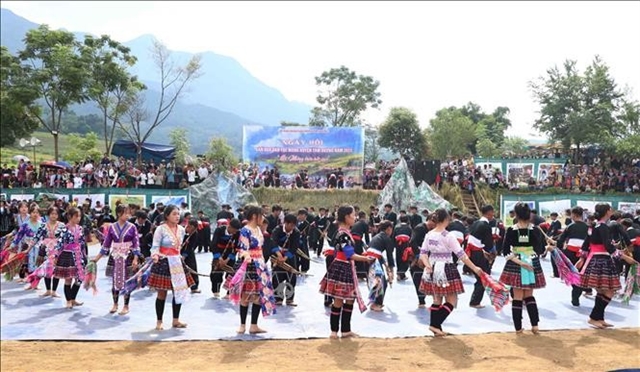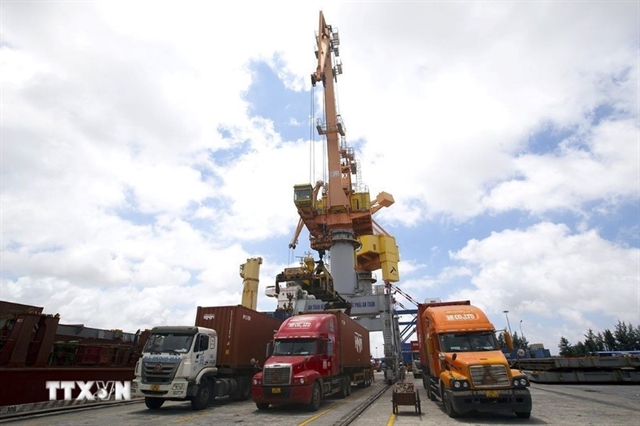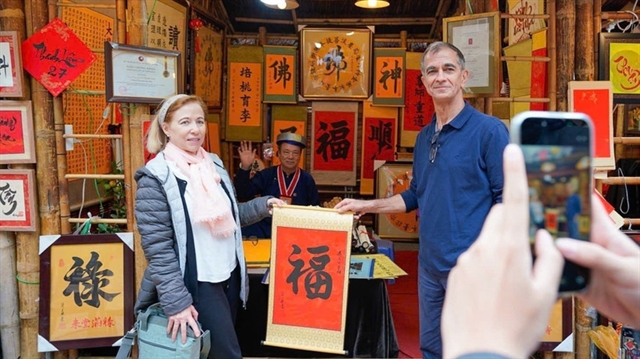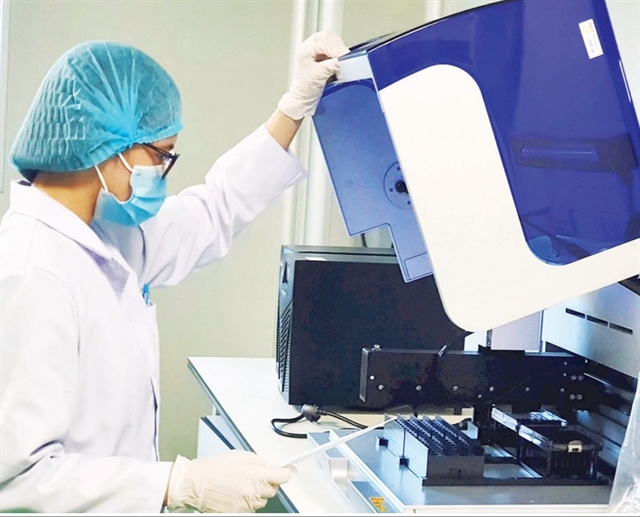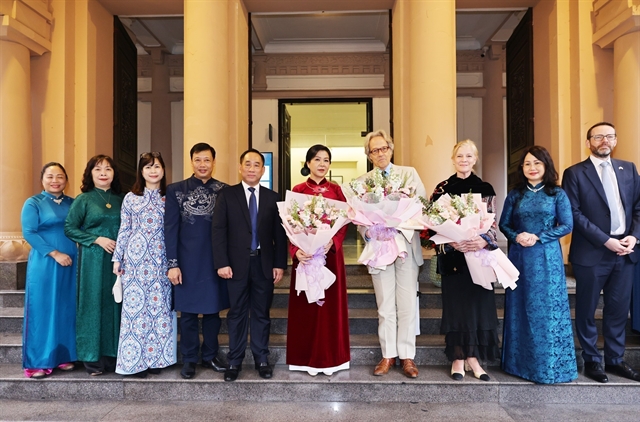 Politics & Law
Politics & Law
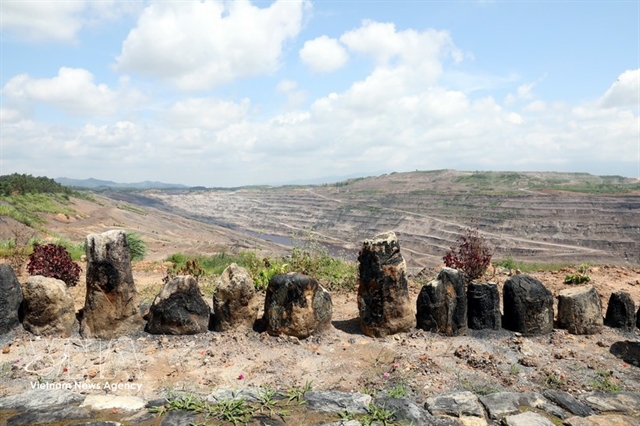
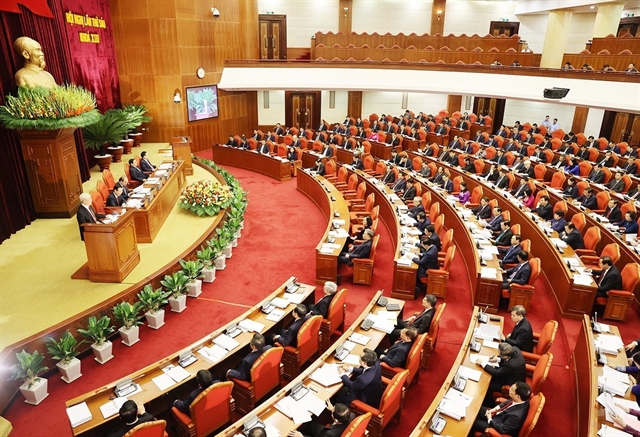 |
| Party General Secretary Nguyễn Phú Trọng addressed the sixth plenum of the Party Central Committee in Hà Nội on Monday. — VNA/VNS Photo Trí Dũng |
HÀ NỘI — Party General Secretary Nguyễn Phú Trọng on Monday called for efforts to maintain macroeconomic foundations and stimulate growth to prepare for all probable scenarios, especially in later 2022 and 2023.
The Party leader made the request in the opening address at the sixth plenum of the 13th-tenure Party Central Committee that opened today in Hà Nội and will last until the end of the week, where the most senior Party officials will be deliberating major issues such as socio-economic development plans, industrialisation and modernisation efforts, the perfecting of a rule-of-law Socialist State, and renovating Party leadership.
Trọng said the consideration of economic plans for 2022 and 2023 takes place as the world is seeing rapid, complex and unprecedented upheavals that are “beyond the forecasting capacity of many countries and international organisations,” which complicate Việt Nam’s efforts to meet its socio-economic goals and recovery programme.
The prolonged conflict in Ukraine, US and Western countries’ sanctions against Russia, intensifying great power strategic competition, China’s persistent zero-COVID policies, major natural calamities across the world, etc. have disrupted global supply chains, hiked up costs of many essential goods and input materials, resulting in serious inflation in most countries and partners.
Trọng also highlighted internal problems – including the weaknesses of the economy, “accumulated for long and exacerbated by COVID-19,” the concurrence of diseases like monkeypox and flu and COVID-19; rising power prices and transport costs – that affect production and people’s lives.
He urged delegates to seriously consider all the reports from relevant authorities to figure out the lessons, identify the challenges to overcome, and prepare for the near future – with pandemic control and socio-economic recovery, maintenance of macroeconomy and ensuring social welfare in mind.
“Is it likely that we will be facing a myriad of challenges and hardships bigger than advantages for development,” he said.
The Party leader also underlined the current issues plaguing the healthcare sector – the shortage of staff, drugs and medical equipment, as well as the difficulties faced by workers, and people in rural, mountainous, border or island areas, while poverty reduction comes face to face with new challenges.
Industrialisation and modernisation
The Party leader in the speech also reaffirmed promoting modernisation and industrialisation is “the central, foremost task” in Việt Nam’s transition period into Socialism.
The Party’s Platform on national construction in the period of transition to socialism (supplemented and developed in 2011) set the vision that “Until the mid-21st century, our entire Party and people must strive to turn our country into a modern industrialised Socialist-oriented country.”
In the 35 years of đổi mới (Renewal), especially in the 2011-2021 period, industrialisation and modernisation have helped economic growth attain a high level (6.17 per cent a year on average), with industry and services accounting for 72.7 per cent of the GDP in 2020, bringing the country to the group of middle-income countries.
“However, due to various reasons, we have not yet achieved the goal of becoming a modern industrialised country by 2020. Strategic breakthroughs have not yet been made,” Trọng said, adding that the internal strength of the economy remains as self-sufficiency and independence is at a low level, with heavy reliance on foreign-invested sectors.
He also highlighted the low productivity, the unrealised potential and role of the private sector in the economy, the limitations of State-owned enterprises, the inconsistent urbanisation, along with environmental and human development issues that have not caught up with economic growth.
At the plenum, it’s expected that a resolution on the promotion of industrialisation and modernisation towards 2030, with a vision towards 2045, will be released.
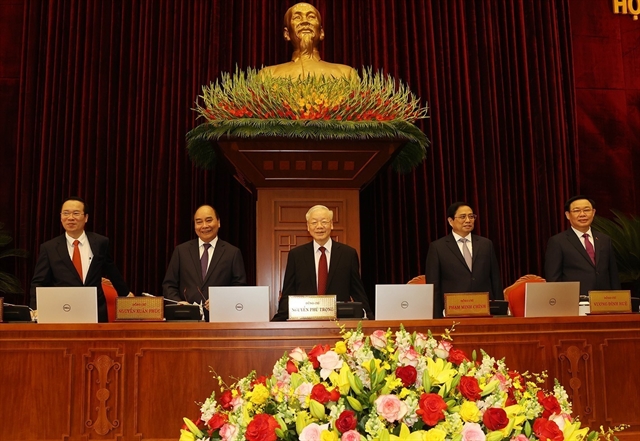 |
| Highest leaders of the country attend the sixth plenum of the Party Central Committee on Monday. — VNA/VNS Photo Trí Dũng |
Socialist State
With regards to the perfecting of the rule-of-law Socialist State in Việt Nam, Trọng stressed that since the birth of the Democratic Republic of Việt Nam (now the Socialist Republic of Vietnam) in 1945 until now, especially during the past 35 years of đổi mới (Renewal), the Party and State have always been steadfast in creatively applying and promoting creatively Marxism-Leninism and Hồ Chí Minh’s thought and selectively absorbing humanity’s universal values with regards to the rule of law, in order to build and perfect the system led by the Communist Party, one that is suitable to the specific conditions of the country.
Specifically, the State management by law has been continually strengthened with the legal system amended and supplemented in accordance with the new situation, Socialist democracy is getting more and more understood and promoted, and people are allowed to conduct businesses in all sectors that are not forbidden by the law as well as are entitled to own possessions while land use rights are protected by the law; people also can exercise their democratic rights in elections and nominating candidates for office, giving feedback to draft laws, as human rights and civic rights are seeing increasing improvements.
But, entering a new stage of development with new requirements and tasks, the 13th National Party Congress has affirmed the need to "Continue to build and perfect the socialist rule of law state in Việt Nam,” and consider this "a central task of political system reform,” focusing on giving priority to building and perfecting the legal system and administrative and judicial reform, the Party leader noted, urging delegations to have serious deliberations and discussions on the matter at this plenum. — VNS

